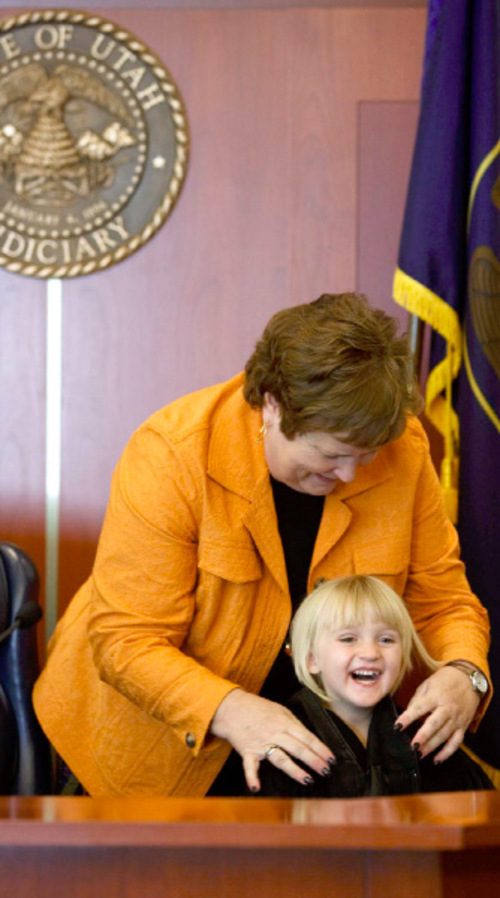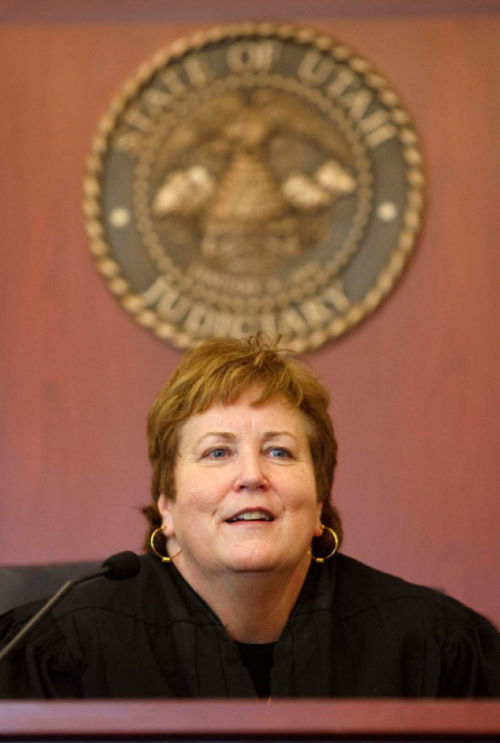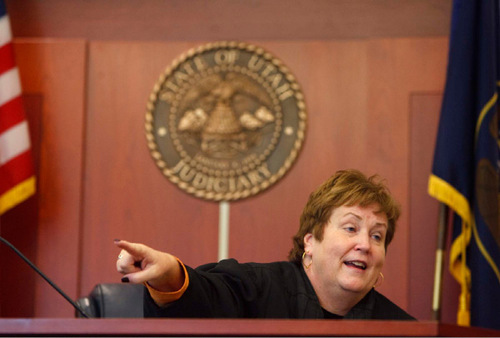This is an archived article that was published on sltrib.com in 2010, and information in the article may be outdated. It is provided only for personal research purposes and may not be reprinted.
After 27 years on the bench — long enough to help shape Utah's juvenile court system into one she proudly calls among the best in the country — Sharon P. McCully on Friday gaveled a close to her judicial career.
McCully leaves her post as a 3rd District Juvenile Court judge with a reputation as a pioneer for open courts, timely management of cases and "frontloading" services so children and parents had the best shot at getting their lives back on track.
McCully said struggles she witnessed took a toll, leaving her emotionally exhausted and ready for retirement.
"It wasn't any one particular case but you just want these kids and their families to get better and most of them do," she said. "But the ones that don't just started going home with me a lot more than they ever did before. I would find myself lying in bed worrying about these kids."
There were other tipping points: She would have faced a retention election this fall. And earlier this year, a brother and sister-in-law died within three months of one another. McCully, 56, now has charge of her 18-year-old nephew.
"Life kind of changed extensively for me then," said McCully, who also has a 23-year-old daughter.
—
Career ends • On Friday, McCully's office at the Matheson Courthouse was stripped bare of files, books, personal photos and stuffed animals she had handed out to children to celebrate their adoptions. Only a can of Diet Coke — McCully's signature drink— on a file cabinet provided a telltale sign it was her space.
McCully, a 1978 graduate of the University of Utah's College of Law, became the second woman to join the Utah Attorney General's Office, where she worked on a task force that created the state's youth correction program. She was 29 when then-Gov. Scott M. Matheson appointed her to the bench in 1983 — the youngest person ever appointed to a judgeship.
In 1992, she became a board member of the National Council of Juvenile and Family Court Judges, where she served as president in 2004-05. The post enabled McCully to bring cutting-edge reform to Utah.
Third District Juvenile Court Judge Kim Hornak calls McCully "innovative" and an "icon" whom other judges and child welfare experts often sought for advice.
McCully had a standard response when people threw up barriers to good ideas, Hornak said, telling them "we should not be looking for ways not to improve the system, but instead say this has to happen and we will make it happen."
As a national council member, McCully helped craft the court section of the Child Welfare Reform Act of 1994, which adopted timelines to reunite children with parents or find them new homes so they didn't languish in foster care.
"That's just a huge change from when I started and took over cases [in which] kids spent 10 years in foster care," McCully said. "It was a culture and it was not unique to Utah, but it was just wrong."
She also was a driving force behind the Delinquency Model Court pilot project launched in Utah in 2008. Utah did not adopt all its reforms, but it did create real change in the process, McCully said.
"We are trying to see kids and hear their cases if they are in detention within just a couple days and for the most part being successful with that so they are not sitting in detention for what was generally 10 days."
McCully was a proponent in the mid-1990s of opening juvenile court hearings to the public — which finally happened in 2003 — and today is satisfied it was the right move.
"When you take away the mystery, the whole secretive feel of it and bring to light the real people, the real children, the real needs, the real families and the truth about them, I think everybody is better," she said.
—
The goodbyes • As retirement neared, McCully began saying goodbye to many children and families she worked with for years under Utah's one family/one judge plan.
"For a lot of them, I may have been the most consistent person in their lives," she said.
McCully was beginning to work with the fourth generation from some families.
"It's frustrating that you can't break the cycle," she said. "You just keep trying, you just keep hoping. I tell the kids, 'It's not written in stone anywhere that every generation of your family has got to go through the same problems. You don't all have to be criminals. You don't all have to be substance abusers.' "
McCully notched many more successes but it's some of the failures that haunt her.
Among them: A boy who came to Utah from Mexico with his mother and first appeared in her courtroom as an abused and neglected 3-year-old. Mom and child were reunited but at age 11, he was back because of delinquency. By age 12, the boy was using methamphetamine and "scoring the drug with his mother."
The boy and several siblings born in the U.S. were placed in foster care. The siblings were adopted. But the boy wasn't because of delinquency and his undocumented status, McCully said.
The state began the process of filing for special immigrant status for the boy, whom McCully said was charming and a straight-A student. But he continued to get in trouble and ended up in juvenile corrections. At 18, the boy was ready for release but had no family or citizenship, the judge said.
Caseworkers encouraged him to remain in custody while his case was processed, but after "months and months and months" he grew impatient and left the system. A week later, he was in a vehicle pulled over in a traffic stop and jailed because of his undocumented status.
"And that's the end of the story as a far as I know," McCully said. "I just feel like we invested in him for almost his whole life, certainly the last eight years, and didn't finish. Part of it was his choice, no question. But I cared a lot about him personally, maybe because I felt so responsible because his whole life had been in our hands."
A handful of failed adoptions also left McCully wondering what went wrong. Yes, the kids are difficult, their behaviors challenging. But "I feel so strongly about the need to achieve permanency for these children whose lives we intervene in to protect and then, for a number of reasons, they don't end up with a true, lifelong permanent family," she said.
More often than not, the system works — as it did in the case of a mother reunited recently with two daughters who came to say goodbye to McCully on Thursday during the annual Kids and Judges Day.
"You know that that's the best possible outcome if you can do it with a relative degree of confidence that the kids are going to be safe, but also have a chance to grow and thrive and be nurtured," she said, showing off the watercolor paintings the girls gave her.
McCully will now serve as a senior judge, hearing cases for other Utah judges as needed. She also has begun to craft a new career: She is teaching a public policy class in the social work graduate program at the University of Utah and plans to teach at the law school, too. She also will consult for the national council.
"I want to still be involved in the field, I want to still contribute, I just needed to not be having to decide these really profoundly important things in people's lives every day," she said. "Hopefully, I can influence the next generation of people who will be working with the children, families and the juvenile court."







